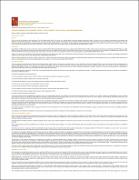| dc.contributor.author | Paganini, Agostino | |
| dc.date.accessioned | 2019-02-15T09:12:11Z | |
| dc.date.available | 2019-02-15T09:12:11Z | |
| dc.date.issued | 2004-04 | |
| dc.identifier.issn | 2073-0683 | |
| dc.identifier.uri | http://hdl.handle.net/20.500.12280/1393 | |
| dc.description.abstract | On the eve of the 3rd millennium, stock was taken of PHC and health sector reforms. The results of a shocking failure of previously advocated goals were evident. Therefore, a new set of goals and mechanisms were adopted under Millennium Development Goals (MDGs). The MDGs are 8: on hunger, education, gender disparity, child mortality, maternal mortality, HIV/AIDS, safe drinking water and partnership. They have implications for multi-laterals as well as for national Governments. Multi-laterals are expected to implement unified and harmonized programmes. Governments are also expected to improve governance, respect the law and mobilise resources for social investment. Recent reviews
do not show that much progress has been made. But perhaps it is still too early. What seems to be missing though is a powerful lobby for the implementation of MDGs. | en_US |
| dc.language.iso | en | en_US |
| dc.publisher | Uganda Martyrs University, Department of Health Sciences | en_US |
| dc.rights | Attribution-NonCommercial-NoDerivs 3.0 United States | * |
| dc.rights.uri | http://creativecommons.org/licenses/by-nc-nd/3.0/us/ | * |
| dc.subject | Millenium Developement Goals (MDGs) | en_US |
| dc.subject | Primary Health Care (PHC) | en_US |
| dc.subject | Health Sector Reforms (HSR) | en_US |
| dc.title | The Millennium Development Goals: The Ultimate Test of Will and Determination | en_US |
| dc.type | Article | en_US |



